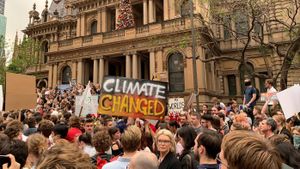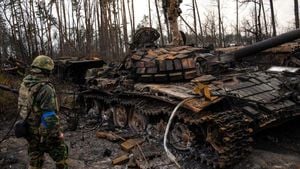With the presidential election date officially set for December 29, 2024, chaos has erupted among Croatia's presidential candidates. The date, which falls just days after Christmas, is viewed by many as disadvantageous, stirring up significant controversy and disappointment, particularly from those running against the ruling government.
Independent candidate Marija Selak Raspudić criticized the timing, declaring, "No normal and reasonable person would like to burden citizens with politics during the holidays when they're with their families." Her comments reflect the sentiments of several candidates who argue the ruling Croatian Democratic Union (HDZ) is using the holiday season to boost their candidate, Dragan Primorac, by capturing voters' attention when they might otherwise be focused on family celebrations.
Further intensifying the criticism, Miro Bulj of the Bridge Party remarked, "At the same time, it appears as if the 'Grinch Stole Christmas' to help his candidate for president," targeting Prime Minister Andrej Plenković for seemingly orchestrated tactics to skew voter turnout. Similarly, Ivana Kekin from the far-left We Can! party dismissed the government's decision as effort to decrease voter turnout, stating, "It’s just a feeble attempt to save his candidate and himself from complete humiliation." These comments highlight the broader narrative where candidates feel marginalized by the timing and are accusing the government's actions of being politically motivated.
On the flip side, Dragan Primorac addressed the backlash by stating he understood the frustration of his opponents but invited them to focus on their campaigns rather than complaining about the election date. His remarks indicate confidence but also show awareness of the impact this timing could have on public perception.
The upcoming election will mark Croatia's eighth presidential contest since independence was declared in 1991. This year leads to what many see as electoral saturation with three major elections slated for 2024: the parliamentary elections held earlier, followed by the European Parliament elections, and topped off with the presidential vote.
To get on the ballot, candidates need to collect at least 10,000 valid signatures from voters, according to regulations from the State Electoral Commission (DIP). Each adult citizen has the right to support one candidate only. Historically, achieving this threshold can be quite challenging, especially for independent candidates who do not have the backing of political parties.
Political analysts have raised concerns about the overall impact of the election timing. Many citizens, already engulfed by holiday festivities, might neglect their civic duties. Lower turnout could affect the legitimacy of the election results, especially if the ruling party is seen to benefit disproportionately from such timing. Some experts suggest conducting elections later, possibly even early January, where political activities could gain more traction.
Meanwhile, Prime Minister Plenković mentioned to the press, “The election will not be held on Christmas or Boxing Day, so everyone can plan their activities accordingly.” This assurance, albeit well-intentioned, hasn't eased the concerns voiced by his political rivals, as they argue such proximity to the holidays will still sentimentally deter voters from participating.
The response from voters could vary dramatically. While some may appreciate the opportunity to vote before entering the first week of the new year, many will likely express frustration at the collision of holiday spirit and political responsibility.
Concerns over voter engagement come at a time when the political climate is already charged. Issues from economic stability to Croatia’s role within the European Union continue to dominate discourse, making political motivations seem all the more precarious during holiday festivities.
Observing previous elections, turnout rates tend to fluctuate when elections coincide with major holidays. Many voters reportedly prioritize personal and family celebrations over participation in political processes, making it imperative for candidates to devise strategic campaigns to connect with voters during such challenging timings.
What makes this election unique is also its proximity to previous voting cycles, particularly the earlier parliamentary elections and the approaching European Parliament elections, creating potential voter fatigue. Analysts are keeping close tabs on how party platforms overlap and diverge, especially among voters who may feel inundated by constant electoral campaigns.
With the clock ticking down to election day and the holiday season fast approaching, candidates naturally rush to finalize their campaign strategies, aware of the unique challenge this timing presents. Uncertainty lingers among them as they all try to cover more ground to encourage voters. While the election date is firmly set, the contest to capture public interest feels like it’s just beginning.
All this leads to pressing questions - how will candidates adapt their messaging? Will voters prioritize their holiday celebrations over casting their ballots? Only time will reveal the consequences of these decisions on the electoral outcome, as Croatia prepares once again to put its democracy to the test amid festive cheer.



